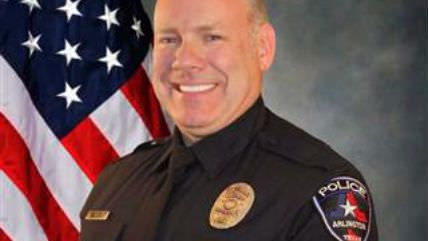Texas PD Fires Cop Who Shot and Killed Christian Taylor
Say the officer exercised poor judgment that put everyone at risk.

As reported in the morning links, the Arlington Police Department in Texas has fired Brad Miller, the police recruit who shot and killed Christian Taylor, a sophomore college football player at Angelo State University who was in a car dealership at 1 in the morning allegedly trying to steal a car. According to police, Taylor had smashed the windshield of one car at the dealership, and at some point told officers he was there to steal a car. Nevertheless, Taylor was unarmed and, according to police, hadn't made any physical contact with any of the officers.
Yesterday, the police department fired Miller for exercising poor judgment. Police say his decision to enter the dealership after seeing the damaged car without telling other officers put everyone at risk.
NBC News reports:
"This is an extraordinarily difficult case," [Police Chief Will] Johnson said. "Decisions were made that have catastrophic outcomes."
The investigation is continuing and will be forwarded to the district attorney's office for consideration and for submission to a grand jury, Johnson said. The criminal investigation is expected to take several weeks. The supervising officer will not be disciplined in the case, Johnson said.
The Arlington Municipal Patrolman's Association said in a statement Tuesday that "every officer, every employee, every American has a right to be free from a rush to judgment without the facts."
"The Arlington Municipal Patrolman's Association supports Officer Miller's right to be judged fairly and completely on facts instead of a snapshot developed in only days," the statement said. "Investigations take time and as Chief Johnson acknowledged, this investigation is not close to being concluded.
"With that said, our thoughts and prayers are with the Taylor family in this time of grief. We again ask that citizens obey the commands of police officers in order to prevent these tragedies from occurring in the future.
The patrolman's association might serve their members better by reminding recruits that even training sessions, when they happen in the real world, have real consequences, and that cops should obey the orders of their superiors and not go rogue.
The patrolman's association is right that every American has "a right to be free from a rush to judgment without the facts." And arguably, when Miller shot Taylor he had made a rush to judgment without the facts, based solely on his feelings.
Miller deserves due process when it comes to the criminal justice system —everybody does. The government must meet a high burden of proof whenever it tries to deprive someone of life, liberty, or property. That Miller, as an agent of the government, deprived someone of their life without due process, and absent a legitimate threat to his own life, ought to, on its own, disqualify Miller from continuing to be an agent of the government.
Miller of course deserves due process, and ought to be considered innocent until proven guilty by the criminal justice system. And the criminal justice system should treat everyone that way. But Miller does not have a right not to be fired from his job if his superiors have decided he exercised poor judgment, especially if that judgment led to a homicide.
Unions, patrolman's associations, and other police groups who demand cops keep their jobs until convicted by a court are the ones putting their members' due process rights in jeopardy by tying their rights to fair treatment in the criminal justice system to their employment status and thus increasing the pressure for a conviction as remedy.
